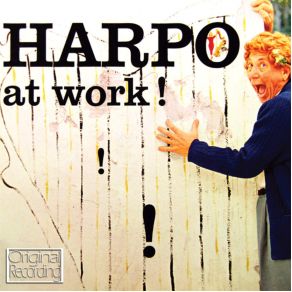Harpo at Work!
Download links and information about Harpo at Work! by Harpo Marx. This album was released in 1958 and it belongs to Rock, Pop, Humor genres. It contains 12 tracks with total duration of 31:29 minutes.

|
|
|---|---|
| Artist: | Harpo Marx |
| Release date: | 1958 |
| Genre: | Rock, Pop, Humor |
| Tracks: | 12 |
| Duration: | 31:29 |
| Buy it NOW at: | |
| Buy on iTunes $9.99 | |
Tracks
[Edit]| No. | Title | Length |
|---|---|---|
| 1. | Laura | 4:26 |
| 2. | My Blue Heaven | 1:37 |
| 3. | The Man I Love | 2:37 |
| 4. | Taking a Chance On Love | 3:41 |
| 5. | Imagination | 3:50 |
| 6. | Aye, Aye, Aye | 2:38 |
| 7. | Harpo Woogie | 1:43 |
| 8. | All the Things You Are | 3:33 |
| 9. | Sweet Sue | 2:03 |
| 10. | Solitude | 1:48 |
| 11. | In a Sentimental Mood | 1:50 |
| 12. | I Got Rhythm | 1:43 |
Details
[Edit]Hipsters seem to prefer Harpo in Hi Fi, released a year earlier, and not just because it has the expression "hi fi" in the album title. That side featured a medium-size jazz group with interesting players such as reed maestro Buddy Collette and swinging cellist Fred Katz. Hearing Harpo Marx in a jazz setting, the result is more than just satisfying an urge for good music in this genre; it fulfills a popular fantasy in which the outrageous, anarchistic nature of the Harpo character joins forces with the rebellious spirit that is jazz. In turn, that cuts to the quick of why the music of Harpo Marx is so unique, indeed, why the entire idea of the man as a musician is so compelling.
Marx the man is virtually indistinguishable from the character of Harpo he created in the public's mind, yet it was clearly the former who entered the studios to record instrumental albums, including earlier projects for RCA as well as the Mercury recordings. For once, however, there is no dichotomy between image and reality. One actually serves the other, as one of the strongest aspects of the Harpo character was the way he would take a breather from the madness all around him and sit down and play a haunting solo on the harp. The fact that the character was mute enhanced the idea even further; here, in music, he could really express himself, and oh so eloquently, turning a knuckle one way to get a certain tone, muffling a ringing chord with a twist of the palm.
Chatter about his lack of orthodox harp technique added another layer of enhancement, connecting back to the idea of Harpo the rebel: of course the sweet little munchkin would never learn orthodox classical technique, not him. Everything to do with Harpo the musician was actually true about the man. He was not mute, but he was a self-taught harpist whose abilities left symphony players and instructors scratching their heads. That such a player might be sympathetic to jazz is a given. Although pianist Chico Marx was the brother with the heaviest credentials in the genre, including once having Mel Tormé drum for him, there are plenty of other signs in the Marx Brothers' films that can be interpreted as jazz simpatico. Free jazz buffs even relish a moment in Monkey Business when during a chase aboard a ship, the gang commandeers all the instruments on a bandstand and carries on roughly in the tradition of an Albert Ayler record.
As for Harpo at Work, the jazz connection would be Charlie Parker With Strings. From the opening "Laura" there is a strong smell of that project and that is meant in a way suggestive of exotic perfumes, perhaps an entire hillside of lavender growing along the Grand Corniche on the French Riviera. What is apparently also a virtuoso display of pedals on the harp is also a gorgeous performance of this standard that stands alongside any of the jazz greats. The program also includes a few Duke Ellington favorites, as well as an "All the Things You Are" and an "Imagination." Even more so than the Bird With Strings project, this material inevitably comes off sounding like easy listening, a conclusion that is influenced greatly by the sound of the harp itself.
The same could be said of the soundtrack sections of the Marx Brothers' films devoted to these sorts of pieces. Even stripped out of that vastly entertaining context, it has to be some of the best easy listening music ever. One main reason is the collaboration that is going on between the harpist and his son Bill Marx, who was involved in both albums but completely took over the arranging for Harpo at Work. As well, no other music in any genre can boast that it is being played by Harpo, after all. Marx would no doubt have emphasized this aspect of his talents more and more had he lived beyond 1964; the loss of additional years of his instrumental work is every bit as great as having Jimi Hendrix check out so early. Like Hendrix, one wonders what he would have gotten into.